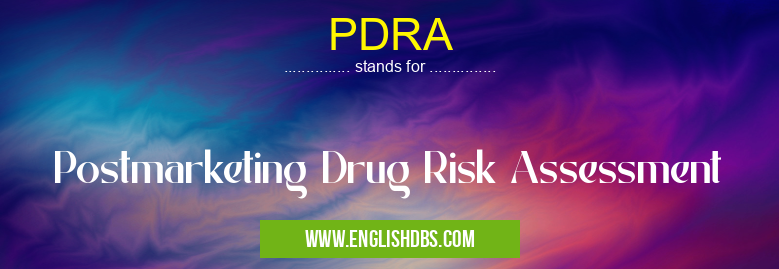What does PDRA mean in DRUGS
Postmarketing Drug Risk Assessment (PDRA) is a crucial process in the pharmaceutical industry that aims to proactively identify, assess, and mitigate potential risks associated with marketed drugs. This proactive approach enables the continuous monitoring and evaluation of drug safety throughout its lifecycle, ensuring the safety and wellbeing of patients.

PDRA meaning in Drugs in Medical
PDRA mostly used in an acronym Drugs in Category Medical that means Postmarketing Drug Risk Assessment
Shorthand: PDRA,
Full Form: Postmarketing Drug Risk Assessment
For more information of "Postmarketing Drug Risk Assessment", see the section below.
PDRA Meaning in Medical
PDRA plays a vital role in the medical field by providing a systematic framework for assessing drug safety after their approval and release into the market. It involves ongoing surveillance, data analysis, and risk management strategies to ensure the safe and effective use of medications.
PDRA Full Form
The full form of PDRA is Postmarketing Drug Risk Assessment.
What Does PDRA Stand For
PDRA stands for Postmarketing Drug Risk Assessment.
Essential Questions and Answers on Postmarketing Drug Risk Assessment in "MEDICAL»DRUGS"
What is Postmarketing Drug Risk Assessment (PDRA)?
PDRA is a continuous process of collecting and evaluating information about the safety of a drug after it has been approved for marketing. It helps to identify and mitigate potential risks associated with the drug and to ensure that the benefits of the drug continue to outweigh the risks.
Why is PDRA important?
PDRA is important because it allows for the ongoing monitoring of a drug's safety after it has been approved for marketing. This helps to identify any potential risks that were not identified during clinical trials, and to ensure that the drug is being used safely and effectively.
Who is responsible for conducting PDRA?
The pharmaceutical company that manufactures and markets the drug is responsible for conducting PDRA. However, regulatory agencies, such as the FDA, also play a role in PDRA by reviewing and evaluating the data submitted by the pharmaceutical company.
What types of information are collected during PDRA?
During PDRA, information is collected from a variety of sources, including:
- Clinical trials
- Spontaneous adverse event reports
- Observational studies
- Safety databases
- Literature reviews
How is the data collected during PDRA used?
The data collected during PDRA is used to identify and assess potential risks associated with the drug. This information is then used to develop risk management strategies, which are designed to mitigate the risks and to ensure that the drug is being used safely and effectively.
Final Words: PDRA is an essential component of the pharmaceutical industry's commitment to patient safety. By proactively monitoring drug safety post-market, PDRA helps ensure the continued safety and efficacy of medications, allowing healthcare professionals and patients to make informed decisions regarding their use. PDRA contributes to the advancement of public health by promoting the safe and responsible use of drugs, ultimately improving patient outcomes and fostering trust in the healthcare system.
